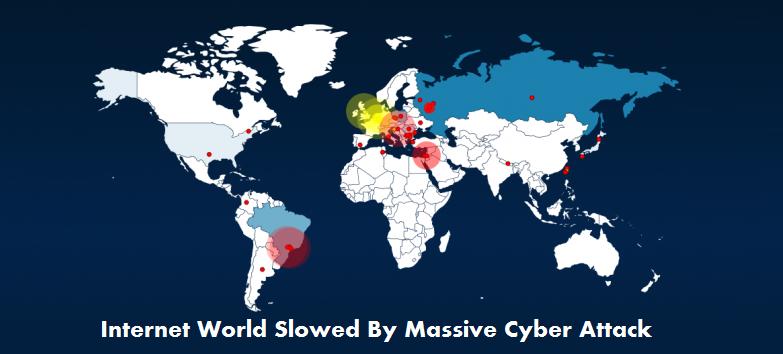Internet World Slowed By Massive Cyber Attack

A massive and relatively new form of cyber attack aimed at a single company is dragging large areas of the global Internet down with it, disrupting services and causing traffic slowdowns around the world.
The attack – which some experts are calling the largest in history – is intended for cloudflare, an anti-spam company based in Geneva and London sites that it considers false flags. Spamhaus blacklists the service providers on the internet, who provides unethical services online. According to experts, it is estimated to be responsible for blocking up to 80% of global e-mail spam.
Spamhaus met the business end of a colossal denial and specialized service distributed attack (DDoS) shortly after Cyberbunker recently added an online service hosting storage space that offers anything “except pornography and anything related to terrorism”, to their blacklists, labeling it a spammer haven – a characterization Cyberbunker rejects. Cyberbunker has no direct responsibility for the attacks, but Sven Olaf Kamphuis, claiming to be a spokesman of Cyberbunker told the BBC that Spamhaus should not be able to determine “what goes and does not go on the internet”.
Spamhaus, which has a contract with the security firm CloudFlare to mitigate the attack, was hit by more typical DDoS attacks plenty of times in the past. In an attack, hackers use botnets or servers they control large amounts pointing fake traffic at a target, hoping to knock it offline. But this situation is different: Hackers are exploiting a known problem in the Domain Name System (DNS), which is a key element of the infrastructure of the Internet, Spamhaus to beat the traffic from all over the world. The scale of the attack is also unprecedented, clocked at up to 300 gigabits per second – many times the average size of DDoS attacks.
The attack, then, has been clogging the Internet infrastructure essential, which is why it is causing Internet services and users across the world to experience slowdowns or stoppages. And while companies may only choose to temporarily close the servers that are being used. To perform or be the target of a DDoS attack, the DNS system cannot go offline, without causing major disruptions to the flow of global Internet traffic – that interruptions would have significant consequences for the global economy.
- How Cloud Computing Is Changing The Labor Market - March 25, 2015
- Adopting Infrastructure as a Service Can be a Good Deal - March 17, 2015
- Will Virtualize? Take These Six Points Into Consideration - March 12, 2015
